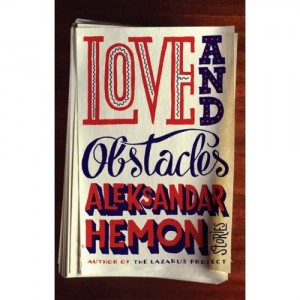 Perhaps, in keeping with the stricter labeling laws, Aleksandar Hemon‘s new collection of stories should list its primary ingredient first. Impediments, more than love, are the foundation of Love and Obstacles: Stories (Riverhead, May 2009). Foreignness, prepubescence, awkward bookishness… Even sex itself is a liability: the characters look ridiculous pursuing it, worse doing it, and we think less of them afterward. Men offer up their partners for it, threaten each other’s mothers and sisters with it, reminisce about it, and thwart each other’s pursuits of it. Aleksandar Hemon’s vivid prose serves as the overlit bar mirror, showing us every wax bead in his characters’ pores.
Perhaps, in keeping with the stricter labeling laws, Aleksandar Hemon‘s new collection of stories should list its primary ingredient first. Impediments, more than love, are the foundation of Love and Obstacles: Stories (Riverhead, May 2009). Foreignness, prepubescence, awkward bookishness… Even sex itself is a liability: the characters look ridiculous pursuing it, worse doing it, and we think less of them afterward. Men offer up their partners for it, threaten each other’s mothers and sisters with it, reminisce about it, and thwart each other’s pursuits of it. Aleksandar Hemon’s vivid prose serves as the overlit bar mirror, showing us every wax bead in his characters’ pores.
The pool of potential partners for Love‘s horny rakes is limited: most of the women inhabit a blissful zone where sex is either before them or behind them. Their children produced, the older women find fulfillment in scolding and cooking; the younger, like the pure Azra of the narrator’s memory in “Stairway to Heaven,” in letter-writing and the idealized status as muse. The few women who are active sexual beings are anesthetized in some way, refusing consciousness of what their bodies are doing, whether they’re stoned, drunk, fame-dazzled, or simply too dumb to mind.
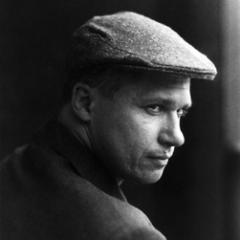
Aleksandar Hemon
Hemon’s unflinching observations on train-wreck sex aren’t misogynistic, though: there are nice, normal women offstage somewhere–they’re just too smart to be taken in by these men. Certainly none on the three continents covered by the indefatigable narrator make a decent showing: not the boozy, blowzy ex-cons who speak wistfully of “fucks” and pretty sisters on the train in “Everything”; not the bluffer Spinelli, in “Stairway to Heaven,” who gleefully admits to buying his girlfriend Natalie for twenty-five thousand dollars; and definitely not Szmura, of “Szmura’s Room,” a defensively patriotic second-generationer who rents out his spare room to newly arrived immigrants.
The sex that happens next door to that spare room is straight from a bad download: in the aptly titled, “Szmura’s Room,” Szmura subjects his roommate Bogdan to an audio clip of his one-night-stand routine, a call-and-response of begging for it and dishing it out. Szmura finds an odd parallel in his rickety old landlady, the grandmother of a discarded girlfriend. Pany Mayska has her own script when she comes to call: the war in Bosnia, the omnipresence and genius of Ukranians. And like Pany Mayska’s cookies and pierogi, Szmura’s sexual performances, rolled out in private, are petty and ridiculous by daylight.
Sex in general, as depicted in Love and Obstacles, is an urgent, shameful need, a valve that needs to be turned by someone, and fast. Here are men who spend an inordinate amount of time pursuing the relief of an urge that is, basically, a lot like going to the bathroom–and even involves a few of the same parts. As they dance around, trying variously to “hold it” or let it out, they make themselves ridiculous.
The narrator’s close description of Szmura’s long-suffering roommate, Bogdan’s, experience suggests that he once slept where Bogdan did–or at least not far from it. This closeness is near-autobiographical, but events are recounted with the incisive, sarcastic distance of a would-be heckler. The narrator himself is buffeted, but never overcome, by drunken camaraderie or hashish: Dionysian abandon is not for him. He can skewer his own accent and foreign oddness as sharply as a malicious third party, but he is powerless–and even a little delighted–as he watches them ruin his chances at friendship, love, and getting laid.
In these stories, the foreigner can’t win because of his bad suit and robotic English, but the ranks of the ridiculous are open to the native-born and the better-dressed, too. Such narrators are lonely guys, but they’re having a good laugh at the sad bastards who actually try to pick up girls.
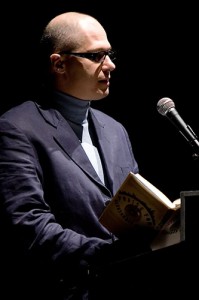
Hemon reads at the 2008 PEN World Voices Festival
Seeking out the love promised us in the collection’s title, we’re fooled for a moment by the Yugoslavian poet Dedo, for whom the narrator of “The Conductor” cherishes a lifelong rivalry–in person and in absentiae. Dedo, stuck for years in his war-torn country, finds critical acclaim after he emigrates for his volume of poems dedicated to his Wisconsin-born wife. When we finally get a look at the “angel wife” whose beauty is elaborated in purple blazon, she turns out to be a beefy woman who manhandles the diminutive Dedo and throws him out for his drunkenness. So much for the former-Yugoslavian national treasure, whose parroted lines have helped the narrator close the deal with a few sympathetic American women. So much for poetry; its only currency comes when a man recites purloined lines with enough feeling to get himself laid.
The traces of love that do emerge in Love and Obstacles are of the cloying, annoying parental variety. In all but two of the stories, parents–possibly the same two–fuss, protect, punish, cook, reminisce at length, and cajole. In “Death of the American Commando,” they try to marry off their writer son to a documentary filmmaker from NYU, a fellow Bosnian and very nice girl. His parents are bewildered by their son, but they earnestly want to help him end up like them–sensibly married, post-sexual, and with a large enough family to divert any future libido. As the most stable characters in the collection, despite their quirks, Mama and Tata emerge as having a point: sweep all this craziness under the rug; get it together; marry this nice girl.
The narrator suffers from an angst his parents seem to have escaped, despite the horrors of war and displacement they’ve endured. Though this angst might be dismissed as a failure to grow up, or as part of the degenerate writing lifestyle his parents fear, the narrator is more than a bilingual Holden Caulfield. He makes a good case for obstacles: perhaps it really is impossible to love anyone you haven’t created from your own body. Or maybe owning the copyright just makes it easier to stay interested.
Further Resources
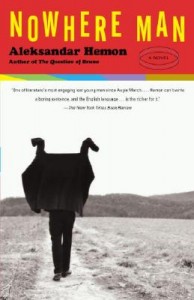
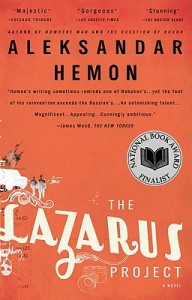
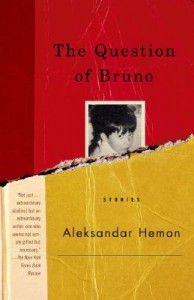
– Read the title story from Love and Obstacles, as it first appeared.
– Hear Aleksandar Hemon read the story “Everything” from Love and Obstacles.
– Pick up one of Hemon’s books from your local indie bookseller: Love and Obstacles: Stories, The Lazarus Project, Nowhere Man, The Question of Bruno: Stories.
– Listen to Hemon discuss Bernard Malamud’s short story “A Summer’s Reading” via the New Yorker.
– Here are some interviews with Hemon: at the Book Bench, at the Quarterly Conversation, and with the Chiacagoist.





